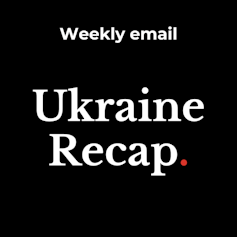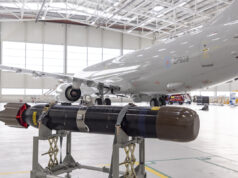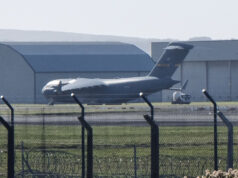Russian voters have been heading to the polls this week. But it would be misleading to say they were voting to choose a president.
That’s already been done for them – it’ll be Vladimir Putin.
If there had ever been any doubt that the president of 24 years would be returned for another six, Russia’s supreme court removed that earlier this month when it upheld a decision of the Central Election Commission to ban anti-war candidate Boris Nadezhdin from running.
Not that he was going to win – the director of independent Russian pollster the Levada Center, Lev Gudkov, estimated that Nadezhdin would have won about 4% of the vote had he been on the ballot. Another anti-war candidate, television journalist Yekaterina Duntsova, was banned from running last December.
This article was written by Jonathan Este, The Conversation and is the opinion of the authors and not necessarily that of the UK Defence Journal. If you would like to submit your own article on this topic or any other, please see our submission guidelines.
Anyone else who might be a focus for opposition is either in jail, dead or exiled.
This year votes will reportedly be cast using a new digital system, which many fear will allow voters to be monitored. But Natasha Lindstaedt, a Russian politics specialist at the University of Essex, believes that with Putin forecast to hoover up 75% of the votes cast, the Kremlin will be more concerned at the idea that people will indicate their opposition to the Russian president by failing to vote at all.
Faced with a similar lack of opposition talent to back, Iranian voters recently stayed at home in droves. Turnout for the parliamentary election was a lacklustre 41% – the lowest for a parliamentary election since the inception of the Islamic Republic in 1979. Lindstaedt says the Kremlin has spent a reported €1 billion (£850 million) on propaganda in the lead up to the poll. It’s also important for Putin to reinforce the image of his legitimacy in case he needs to call on more Russians to fight.
If you want to read more about this week’s election, Adam Lenton – a Russia expert at Wake Forest University in North Carolina – offers this analysis which identifies three key issues to look out for.
If you are thinking that Putin will never relinquish his grip on power, you are probably right. Robert Person, a professor of international relations at the United States Military Academy West Point, says Putin’s got every reason to want to die in office – not least because any successor would likely want him out of the way. So, as Person writes here, there’s no succession plan and no public figures who – for the present at least – appear capable of mustering sufficient support to effect a seamless transfer of power.
Were Putin to die tomorrow, he’d be succeeded by the prime minister, Mikhail Mishustin. But Mishustin is a virtual nonentity, a former tax official with no base of his own and a trust rating of just 18%. It’s hard to see him having the momentum to take the reins on a permanent basis.

Since Vladimir Putin sent his war machine into Ukraine on February 24 2022, The Conversation has called upon some of the leading experts in international security, geopolitics and military tactics to help their readers understand the big issues. You can also subscribe to their fortnightly recap of expert analysis of the conflict in Ukraine.
One opposition group that is making its voice heard is made up of wives of Russian troops fighting in Ukraine. Previously, write Jennifer Mathers and Natasha Danilova, it had been soldiers’ mothers who were very vocal in their opposition to the war in Chechnya in the 1990s. This time round it’s the wives of men who are serving, reflecting perhaps the relatively older age profile of combatants in Ukraine. Many soldiers are in their 30s and 40s, rather than their late teens and early 20s, as in Chechnya.
Mathers and Danilova, experts in international relations at the universities of Aberystwyth and Aberdeen respectively, say the women have gradually increased the public pressure on the Kremlin as the conflict has moved into a third year, moving from largely online opposition to regular protests. Rather than set themselves against the war in itself, they are focusing on securing concessions such as more regular leave for their loved ones.
But, Mathers and Danilova note, there are signs that the Kremlin is beginning to up the pressure on these women, visiting their homes and mounting increasingly strident media attacks on their group.
British boots on the ground?
Red faces among Germany’s political and military leadership recently when it emerged that an unencrypted phone call between senior Luftwaffe officers had revealed that British troops are in Ukraine helping with the deployment and targeting of Storm Shadow cruise missiles. The call had been intercepted and passed to Russian state broadcaster RT.
The Kremlin’s press secretary, Dmitry Peskov, said the call was “proof†that the west was orchestrating the war against Russia. Closer to home, one question being asked was whether this makes the UK a co-combatant.
Christoph Bluth, professor of international relations at the University of Bradford, examines the international law involved and finds that under principles established since the second world war, helping Ukraine in this limited way does not violate the UK’s neutrality. But Moscow will no doubt use it as a political opportunity to escalate its anti-Nato rhetoric, Bluth writes.
Memory and culture
There was some heartening news from Washington this week when it was revealed that Joe Biden had managed to scrape together US$300 million (£235 million) to supply the Ukraine military with at least some ammunition as it struggles to hold the line against better-supplied Russian forces. But the west’s slow response to pleas from the Ukrainian president, Volodymyr Zelensky, for more military aid remains a huge concern. As the map below shows, Russia continues to make gains west of the town of Avdiivka, which they captured in mid-February.
Gervase Phillips, a historian at Manchester Metropolitan University, see parallels with the Polish uprising in November 1830. Initially, support for the Polish people against the oppressive rule of the autocratic Tsar Nicolas I was widespread, and early success on the battlefield made this seem a worthy cause in liberal salons across Europe.
But, Phillips writes, this was not to last. The Poles’ European allies failed to back their intentions with military aid, and the uprising developed into a war of attrition in 1831. Eventually Russian troops fought their way to Warsaw and the uprising failed. Will Ukraine suffer the same fate?
Pope Francis I certainly appears to think so. The Holy Father sparked outrage in Kyiv (and elsewhere) last weekend when in an interview with Swiss public broadcaster RSI, he said Ukraine should find the “the courage to raise the white flagâ€. “When you see that you are defeated … you need to have the courage to negotiate,†he added. This drew an immediate and caustic response from Ukrainian foreign minister Dmytro Kuleba: “Our flag is a yellow and blue one,†he said, adding: “This is the flag by which we live, die, and prevail. We shall never raise any other flags.â€
Tim Luckhurst, a former BBC journalist now researching second world war newspaper history at the University of Durham, was reminded of the way Pope Pius XII failed to openly criticise Nazi Germany during the worst excesses of the Holocaust, preferring instead to safeguard the rights of German Catholics. Meanwhile round-ups of Italian Jews took place within sight of the Vatican.
Meanwhile, as admirers of the late Russian opposition leader Alexei Navalny gathered in Moscow for his funeral, the biggest festival of documentary film in the former Soviet countries opened in Latvia with a minute’s silence. Artdocfest was first held in Moscow in 2007 and showcased some of the best Russian and foreign-language documentaries. After Russia annexed Crimea in 2014, the Kremlin began to pressure its organisers and withdrew all state support. In March 2022, after Putin launched his invasion, the festival relocated permanently to Riga.
Jeremy Hicks, professor of Russian culture and film at Queen Mary University of London, gives us a taste of the best films being showcased at the festival.
Podcast: Putin’s conspiracy theories
Aptly enough, the subject of our podcast The Conversation Weekly is how Putin has managed to exert such a firm grip on power in Russia. Host Gemma Ware talks with Ilya Yablokov, a specialist in disinformation at the University of Sheffield.
Yabolokov, who has written regularly for us on the Russian media, has been researching the way Russia’s conspiracy culture has become a key tool for Putin’s regime: “Conspiracy theories are one of the few ways of keeping the society together and to prevent the change of the regime,†he says.
Incidentally, one of those theories is that shadowy western agencies orchestrated Navalny’s death to make Putin look bad. True or not, that mission has been well and truly accomplished.
Ukraine Recap is available as a fortnightly email newsletter. Click here to get recaps directly in your inbox.![]()
Jonathan Este, Senior International Affairs Editor, Associate Editor, The Conversation
This article is republished from The Conversation under a Creative Commons license. Read the original article.













OT(almost) I see Grant Schapps abandoned his trip to UKR because of security fears. He called Russian attacks, “reckless, ruthless and careless”. That’s exactly what I would call Tory defence policy, running down the armed forces to tiny levels & creating significant capability gaps. You don’t deter aggression by record peacetime weakness. Adm Radakin was also in the visiting party.
The blocking of GPS on the RAF Falcon Jet he was travelling in the other day to Poland came back to bite the conservatives after it was revealed the secure commas package it should have been fitted with was cancelled to save money.
I quote from forces news:
“Russia was able to jam the GPS signal on an RAF aircraft carrying the Defence Secretary because it was not fitted with military-grade protective systems to cut costs, it has been revealed. Military experts quoted in The Times newspaper said the plane was essentially “defenceless” when it flew close to Russian territory because it did not have military-standard aircraft electronics such as anti-missile jammers and jam-proof communications. Grant Shapps’ RAF Dassault 900LX Falcon jet Envoy suffered electronic interference caused by Moscow while flying close to the Russian exclave of Kaliningrad, sandwiched between Lithuania and Poland.
It was announced in 2022 that the Envoy aircraft that was carrying Mr Shapps would be upgraded to have full military and operational capability.
The two Dassault 900LX Falcon VIP aircraft known as the ‘Envoy IV’ joined the RAF fleet in 2023 with the role of transporting high-priority military personnel.
In December last year, the MOD issued a tender notice to upgrade the two Envoy aircraft with military defensive mechanisms.
The MOD said that theyare in the process of completing the requirement to transition Envoy from civil to military operations.
This will include military modifications in accordance with military regulatory approvals.
It is unclear how long it will take to get the jet up to the required military standard as all upgrades must go through regulatory approval, which takes time.
The Times reported that Ben Wallace, the defence secretary at the time of the aircraft’s commissioning, made the decision to not upgrade the Envoys with military protective mechanisms so that money could be prioritised elsewhere in the RAF.
I hear that the previous MoD exec jet, BAE 146(?), had this kit.
Any bets on how fast he chased the upgrades after landing ? 🤣
Not his job. Probably still doesn’t know there was a problem or why.
Hang on. Ben would have understood the implications (assuming you believe anything written in the Times nowadays) yet he decided to divert the cash elsewhere. Whatever was elsewhere was clearly more important.
Andy I thought everyone would be Putin bashing in this article. Talking about a free and fair general election which Russians have little concept of seems odd here.
very important to remember how important the power to vote out idiots really is in keeping a governor and leaders somewhat honest…that’s the wonder of a proper democracy..we don’t really get much choice in who our leaders are ( only really getting a choice of two candidates selected by a very small self selecting electorate..mps and party members)…but every 5 years we do get the option to kick the leadership out if they are crap…there is actually a surprising level of power in that.
Additional to other areas of international law, there’re also the Budapest Memoranda. Regardless of any nuances in interpretation (endlessly loved by lawyers) over the scope of the above in aggregation, nowhere does it advocate unprovoked invasion of subject states’ internationally recognised sovereign borders – Ukraine being one of those subject states; particularly by one of the security guarantors, to my mind.
Since Russia, alongside the US & UK are specific guarantors, then not only is Russia in flagrant breach, but all and any help given by the other two is both a moral & defensive obligation under wider OSCE auspices, outside of any ‘NATO obfuscation’ that Putin & Co may attempt to introduce.
As Russia has no interest in following international law whatsoever why doesn’t the west just release the £300b in frozen assets and give them to Ukraine for use in their defence against this pre mediated war?
Last I heard issue was still under active discussion. Worth seeing what, if anything transpires.
Ask China and India why still russian reserves are not sended to Ukraine. It,s not so easy.
Wa.s there another name on the ballot paper? Think I know the answer, but it would have been worth stating in the article.
Yes they had a number of inspiring choices
1) NIKOLAI KHARITONOV..communist party candidate who’s campaign line is “ why would I criticise Putinâ€2) LEONID SLUTSKY..LDPR party..ultra nationalists..actually make Putin look like a moderate..I’m pretty sure he wants us nuclear weapons on the UK…3)VLADISLAV DAVANKOV..who has various awards from Putin and said he would not criticise his opponents…is campaign was “ time for something newâ€â€¦the most moderate candidate who feels Russia many have got enough territory from Ukraine and may wish to consider a peace that consolidates what they have..
The key characteristic of these candidates is that they are all political none entities who are mid ranking politicians who all actively support Putin..and they each poll no more than 5%.
Bit the real fix is not the people on to ballot but the people not on it
ALEXEI NAVALNY…imprisoned and murdered…all his associates have now fled Russia, are imprisoned or dead.
BORIS NADEZHDIN anti war candidate..basically to run you need 100,000 signatures…between the time he got the signatures and the submission date, as you would expect a few of the 100,000 had died…the Russian court basically looked at every signature and at the deadline said sorry some of these are dead people your barred from campaigning.
YEKATERINA DUNTSOVA anti war candidate, election officials band her from standing due to some “ issues with her papers submittedâ€..
“